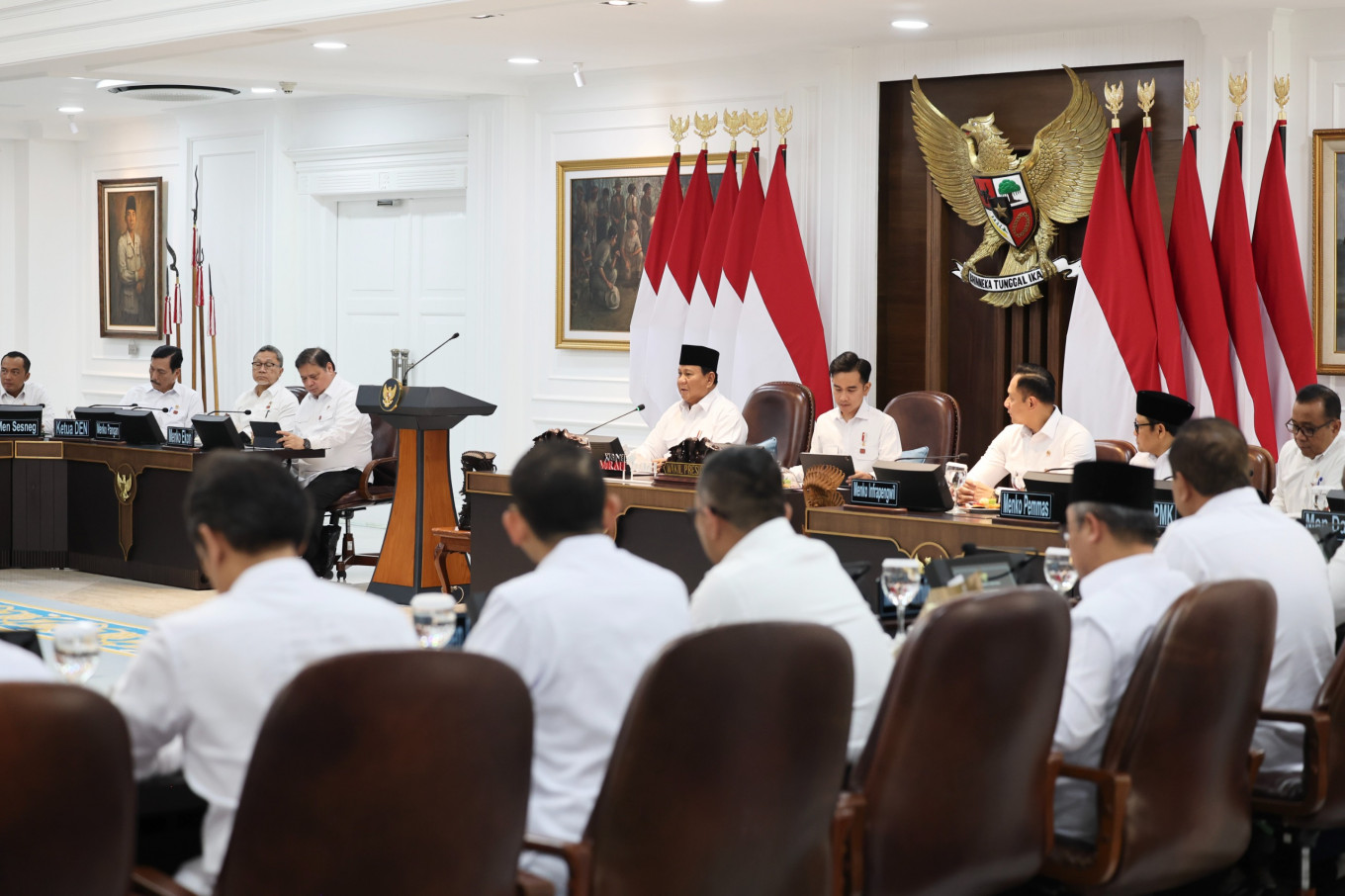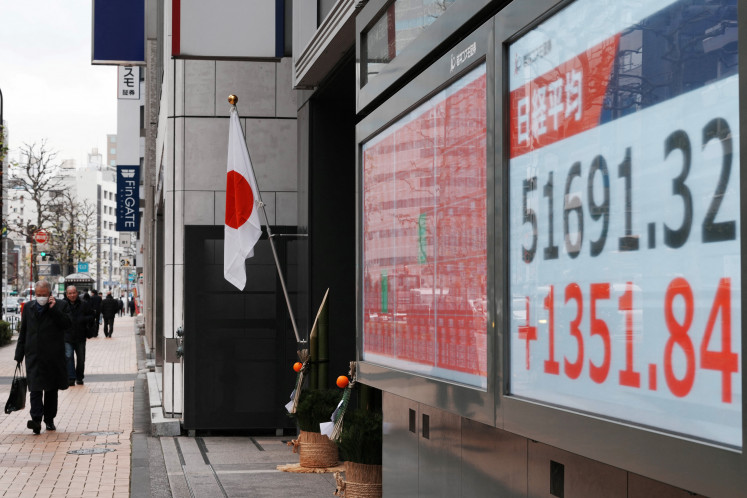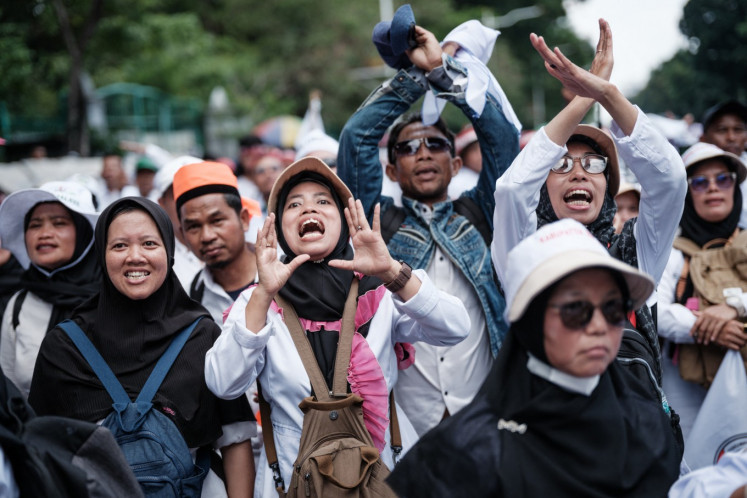Popular Reads
Top Results
Can't find what you're looking for?
View all search resultsPopular Reads
Top Results
Can't find what you're looking for?
View all search resultsFatty bureaucracy
Bureaucratic “fat” can strengthen implementation if managed well, yet too much of it risks clogging the system.
Change text size
Gift Premium Articles
to Anyone
 President Prabowo Subianto (center) addresses a plenary cabinet meeting on Aug. 6 in the State Palace, Jakarta. He emphasized that Indonesia’s national transformation strategy must be rooted in realism as it navigates escalating global conflicts and economic uncertainty.
(Courtesy of/BPMI Sekretariat Presiden)
President Prabowo Subianto (center) addresses a plenary cabinet meeting on Aug. 6 in the State Palace, Jakarta. He emphasized that Indonesia’s national transformation strategy must be rooted in realism as it navigates escalating global conflicts and economic uncertainty.
(Courtesy of/BPMI Sekretariat Presiden)
W
hile former president Joko “Jokowi” Widodo often preferred flexible, ad hoc task forces to tackle flagship projects, President Prabowo Subianto is building his legacy by expanding government bodies with new ministries and agencies.
The latest proof came this week. On Monday, Prabowo established the Mineral Industry Agency to oversee Indonesia’s rare earths and the Java Northern Coast Management Authority, tasked with bringing his giant sea wall vision to life.
A day later, the House passed the amended Haj Law that paved the way for a dedicated haj affairs ministry, elevating the status of the current Haj Organizing Agency.
State apparatus expansion has become the new norm since President Prabowo took office last year. While every president since the reform era has governed with only 30 to 35 ministries, the former general has stretched the number to 48 by splitting existing ministries in areas such as law, housing and education into multiple entities.
He has also added new agencies, such as the state asset fund Danantara and the National Nutrition Agency (BGN) to run his free meal program.
The ballooning bureaucracy has sparked debates, with critics warning of overlapping authority and slower decision-making. They also pointed out the rising cost with additional ministries and agencies, which contradicts Prabowo’s own pledge to cut spending in order to finance his flagship programs.
While a larger cabinet can mean greater specialization and representation, it may also result in fragmentation and inefficiency. It is similar to fat in the human body, which is essential in the right amounts but dangerous in excess. Bureaucratic “fat” can strengthen implementation if managed well, yet too much of it risks clogging the system.
Proponents may argue that the introduction of new agencies could lead to more focused execution. However, the promise may prove illusory, as Prabowo has placed sitting ministers in charge of the new agencies instead of appointing new figures.
He named Higher Education, Science and Technology Minister Brian Yuliarto as head of the Mineral Industry Agency, while Deputy Maritime Affairs and Fisheries Minister Didit Herdiawan Ashaf was appointed to lead the Java Northern Coast Management Authority, raising doubts about whether they can truly focus on these new mandates without neglecting their current duties.
This mirrors how Prabowo appointed Rosan Roeslani the CEO of Danantara without removing him from his position as Investment Minister, as well as his practice of naming many deputy ministers to second jobs as commissioners of state-owned enterprises.
We may need some time to conduct a comprehensive checkup and study the results, but the President could at least explain why the country needs a dedicated mineral agency that reports directly to him when the Energy and Mineral Resources Ministry already exists.
If the concern is the ministry’s capacity to manage rare earth reserves, would it not be simpler and more effective to replace the minister with someone more capable? If the agency’s task is more research-oriented, why not place it under the auspices of the Higher Education Ministry, which already has the same individual as its leader?
A similar question arises with the giant sea wall project. It was initially under the mandate of Coordinating Infrastructure Minister Agus Harimurti Yudhoyono, yet Prabowo has now shifted responsibility to a newly created agency led by a deputy minister from another ministry.
Why strip the task from an existing minister only to hand it over to another official under a new banner, instead of assigning it to existing ministries or pushing them to work together?
That said, Prabowo faces a tough challenge to ensure the “fat” in his administration works in harmony rather than weighing the system down. And the burden will only grow heavier if he continues his habit of piling on new ministries and agencies.
To keep the machinery of government healthy, routine checkups and set clear targets for each institution are essential. And if even the slightest signs of discomfort appear, the President may need to consider a political “diet”, trimming the excess fat and preserving a lean, functional body of government.










